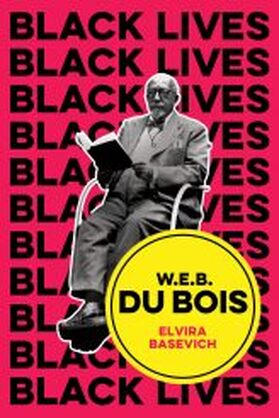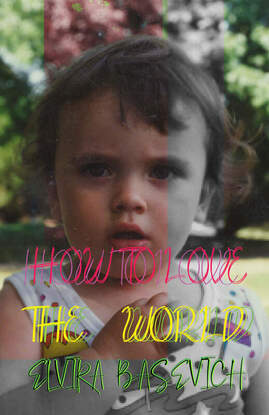W.E.B. Du Bois: The Lost and the found
Out Now!
"Basevich has the surest feel for her protean subject that I've read in a long time."
David Levering Lewis, American historian and twice Pulitzer-Prize-winning biographer of Du Bois, Columbia University
"Unique among books on Du Bois, Basevich originally and persuasively presents a liberal ideal of civic enfranchisement as the heart of Du Bois' thought."
Chike Jeffers, Dalhousie University
"In a direct and accessible prose, linking philosophical abstraction with grassroots activism, Elvira Basevich brings us a Du Bois by no means merely a figure of historical importance but very much a thinker relevant for the social justice struggles of today."
Charles Mills, City University of New York
"With the breadth of a biographer, the depth of a philosopher, and the vision of a poet, Elvira Basevich gives us a compelling elucidation of W.E.B. Du Bois' radical liberalism. This is essential reading for understanding why Du Bois still matters!"
Melvin Rogers, Brown University
David Levering Lewis, American historian and twice Pulitzer-Prize-winning biographer of Du Bois, Columbia University
"Unique among books on Du Bois, Basevich originally and persuasively presents a liberal ideal of civic enfranchisement as the heart of Du Bois' thought."
Chike Jeffers, Dalhousie University
"In a direct and accessible prose, linking philosophical abstraction with grassroots activism, Elvira Basevich brings us a Du Bois by no means merely a figure of historical importance but very much a thinker relevant for the social justice struggles of today."
Charles Mills, City University of New York
"With the breadth of a biographer, the depth of a philosopher, and the vision of a poet, Elvira Basevich gives us a compelling elucidation of W.E.B. Du Bois' radical liberalism. This is essential reading for understanding why Du Bois still matters!"
Melvin Rogers, Brown University
HOW TO LOVE THE WORLD
Out Now!
2019 Poetry Contest Winner with [PANK] Books
Selected as a finalist of the
2020 NATIONAL JEWISH BOOK AWARDS
in the category of
Poetry:
Berru Award in Memory of Ruth and Bernie Weinflash
Judges' Comments:
"In How to Love the World, Jewish Uyghur refugee Elvira Basevich orients herself in a world where 'a Jews looks at an Arab / and see herself,' where 'The part of me that’s a Jewish poet / is lost in a parking lot in Detroit,' where her father — once a Professor of Mathematics at Moscow State University — now drives a taxi in New York City and curses customers who dare to hail his cab as he works out theorems at red lights. Basevich begins with her own mid-migration birth in Vienna and then hurries the reader across borders, disciplines, and languages until we’re breathless — not just from the difficult journey, but also from the urgent delight of Basevich’s humor and maximalism. Whether relating to Lebanese refugees or Immanuel Kant, Basevich insists that 'the writing of poetry is a kind of time travel; and it is always a preparation for love.'”
"In How to Love the World [...] Elvira Basevich imagines the feelings and thoughts of her refugee mother as she retraces the woman’s journey. The runner-up title—written in the form of a sprawling and emotional epic poem—contextualizes this odyssey in terms of nationalism, feminism, and overall humanity, strikingly questioning who gets to call a country home. The book’s thoughtful, fascinating grasp of many nuanced intersections hint at Basevich’s passion for philosophy (she teaches in the philosophy department at the University of Massachusetts), as well as her complicated yet fiercely loving appreciation for mother-daughter relationships."
Selected as a finalist of the
2020 NATIONAL JEWISH BOOK AWARDS
in the category of
Poetry:
Berru Award in Memory of Ruth and Bernie Weinflash
Judges' Comments:
"In How to Love the World, Jewish Uyghur refugee Elvira Basevich orients herself in a world where 'a Jews looks at an Arab / and see herself,' where 'The part of me that’s a Jewish poet / is lost in a parking lot in Detroit,' where her father — once a Professor of Mathematics at Moscow State University — now drives a taxi in New York City and curses customers who dare to hail his cab as he works out theorems at red lights. Basevich begins with her own mid-migration birth in Vienna and then hurries the reader across borders, disciplines, and languages until we’re breathless — not just from the difficult journey, but also from the urgent delight of Basevich’s humor and maximalism. Whether relating to Lebanese refugees or Immanuel Kant, Basevich insists that 'the writing of poetry is a kind of time travel; and it is always a preparation for love.'”
"In How to Love the World [...] Elvira Basevich imagines the feelings and thoughts of her refugee mother as she retraces the woman’s journey. The runner-up title—written in the form of a sprawling and emotional epic poem—contextualizes this odyssey in terms of nationalism, feminism, and overall humanity, strikingly questioning who gets to call a country home. The book’s thoughtful, fascinating grasp of many nuanced intersections hint at Basevich’s passion for philosophy (she teaches in the philosophy department at the University of Massachusetts), as well as her complicated yet fiercely loving appreciation for mother-daughter relationships."

